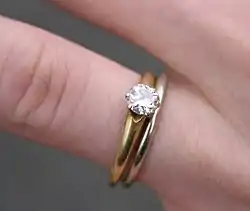anel
Galician
Etymology
From Old Portuguese anel, borrowed from Old Occitan anel, from Latin ānellus (“finger ring”). Compare the inherited form elo.
Related terms
Old French
Noun
anel m (oblique plural aneaus or aneax or aniaus or aniax or anels, nominative singular aneaus or aneax or aniaus or aniax or anels, nominative plural anel)
- ring (small metal torus-shaped object)
- circa 1150, Thomas d'Angleterre, Le Roman de Tristan, page 164 (of the Champion Classiques edition, →ISBN, line 1980:
- Un anel d'or trait de sun dei
- she removed a gold ring from her finger
-
Portuguese

anel
Etymology
From Old Portuguese anel, borrowed from Old Occitan anel, from Latin ānellus (“finger ring”). Compare the inherited doublet elo. Cognates include Catalan anell, French anneau, Italian anello, Spanish anillo.
Sense 2 likely comes from the round form of the anus.
Romansch
This article is issued from Wiktionary. The text is licensed under Creative Commons - Attribution - Sharealike. Additional terms may apply for the media files.